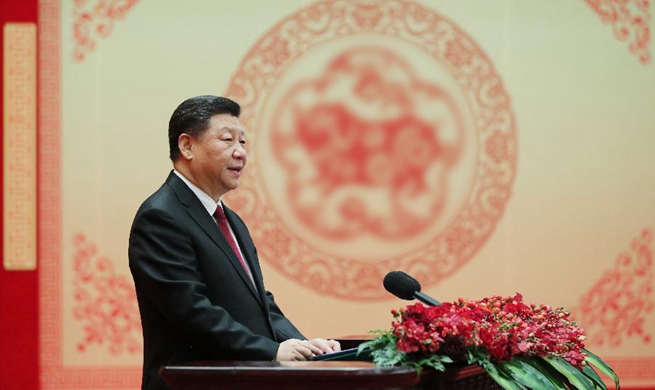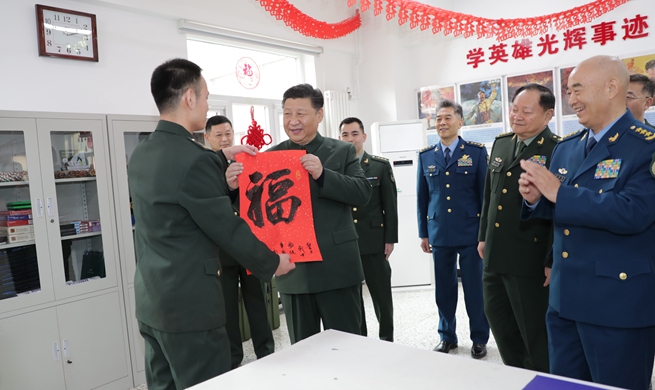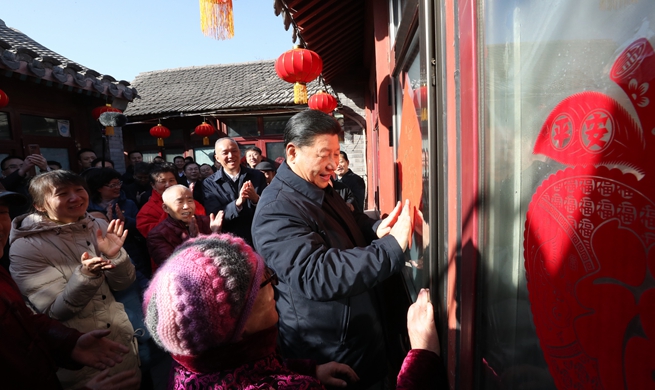WASHINGTON, Feb. 4 (Xinhua) -- U.S. State Department said here on Monday that an upcoming meeting by members of the Global Coalition to Defeat the Islamic State (IS) will focus on the resources needed and specific plans in 2019.
In a background briefing previewing the meeting conducted via teleconference, several senior State Department officials asking for anonymity said that the ministerial meeting of the Global Coalition to Defeat IS, the 10th of its kind since the coalition was found in 2014, would take place at the State Department on Feb. 6.
However, U.S. President Donald Trump's latest decision to withdraw U.S. troops from Syria and his latest controversial remarks concerning U.S. forces in Iraq have, to quite an extent, overshadowed the upcoming meeting.
PLAN IN 2019
According to U.S. officials, the attending nations and organizations will discuss how to "liberate" the eight million people that were under the IS' rule in Iraq and Syria, take away IS' revenue from taxes, oil and natural gas, and increase the pressure on the IS' branches around the globe.
"But most importantly the resources that will be needed in 2019 to build on the military and diplomatic gains," officials said. "It comes at a critical time in our mind because we're near the end of the military operations against Daesh and as you -- as has been announced, U.S. troops will be departing Syria."
Speaking about the coalition's plan to move forward with its campaign to defeat the IS, the U.S. diplomats said that there would be four themes to be discussed during the ministerial meeting, namely, to recognize what must be done to ensure an enduring defeat of the IS in Iraq and Syria, to affirm the coalition's ties and commitments with the new Iraqi government, to map out the requirements for coalition and maintain pressure in the global fight, and to ensure that the IS would be held accountable for the crimes it has committed.
According to the U.S. officials, Secretary of State Mike Pompeo would deliver the opening remarks at the morning session and participate in a small group ministerial meeting that also included Egypt, France, Germany, Jordan, Saudi Arabia and Britain. A joint statement was expected to be released following the afternoon plenary.
They added that the number of the coalition members have grown from 12 in September 2014 to 79 now, which included 75 nations and four international organizations.
CONTROVERSIAL "CONSISTENCY"
The U.S.-led coalition has been engaged in an operation to drive out the IS militants from their last stronghold in the eastern Euphrates region in eastern Syria.
In December, however, Trump abruptly announced to withdraw U.S. troops from Syria, citing that the local IS force has been largely defeated.
Nevertheless, several bombs have been detonated in Syria since then, claiming lives of several U.S. soldiers and local militants. Former U.S. Secretary of Defense James Mattis also resigned largely due to Trump's withdrawal decision.
The U.S. State Department officials on Monday tries to defend Trump's remarks amid growing domestic questions.
"U.S. goals in Syria -- notwithstanding the Defeat ISIS campaign, which remains -- the goals remain there," they said. "A withdrawal of U.S. forces from northeast Syria is the change in the way we employ our military means under our broader strategy. It's not a change in the strategy."
"There's a consistency... on the judgment that there is no military solution to the Syrian conflict, that settling the conflict requires a political solution," the officials said.
TRUMP'S IRAQ-RELATED COMMENTS REFUTED
During an interview with CBS television broadcasted on Sunday, Trump reportedly said that the important role of U.S. troops in Iraq is "to watch Iran," sparking anger and rejection in the Middle East nation.
Iraqi President Barham Salih on Monday rejected any role for U.S. troops in Iraq beyond helping Iraq's security forces, saying that "Trump did not ask for our permission to watch Iran. Do not burden Iraq with issues that don't represent a priority to it."
Former Iraqi Prime Minister Haider al-Abadi also tweeted on Monday that "Iraqi sovereignty must be respected."
"Its interests should not be compromised. Iraq should not be used as a spring board to attack its neighbours," he warned. "We are not proxies in conflicts outside the interests of our nation."
When asked to comment on Iraq's responses, the State Department officials only said that "our troops are there in a relationship with the government -- by invitation of the Government of Iraq, articulated by the strategic framework agreement."
In an apparently different set of notes from Trump's, they added that the U.S. forces in Iraq are there for "the enduring defeat of ISIS. That hasn't changed."

















